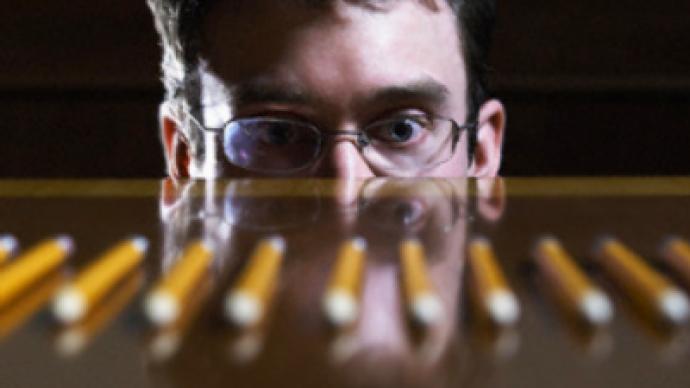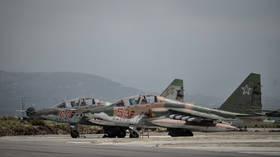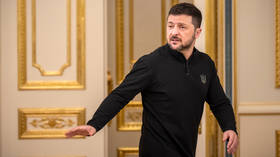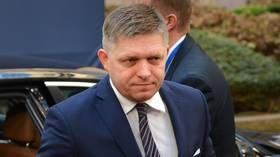RT Expert View: Looking back at year 2008

With the end of the year just step away, RT’s experts take a look at the outgoing year. What were the main events and trends in 2008 and what can we expect next year?
Peter Lavelle, RT's political commentator and anchor
What kind of year has it been for Russia? Economically it is doing better than many countries and has the means to deal with the global crisis. Nonetheless, Russia has been hit hard.
In terms of the foreign policy, it's a mixed bag. NATO was deterred to expand, but relations with the EU and the US are strained. However, it is clear to all that Russia will insist that its voice be heard on the international stage.
Finally, do you expect more of the same next year?
Joera Mulders, independent Russia watcher, Amsterdam
The year 2008 has brought more nuance into Russia's self image as well as Russia's international image. Longstanding questions have received answers. New questions are posed. In the early nineties, the imagined community was shattered. There were a million Russias. Putin has build a new imagined community, for a large part around himself. He is a modernizer and respects the past. He is pro business and a populist. He is devout Orthodox believer and the president of a multi-religious Russia. Under Putin's two presidencies Russia's self-image contracted.
The million Russias became one. Not for everyone of course, but I bet that after the successes of the Russian football team in Switzerland even the inhabitants of an Other Russia joined their compatriots in the streets. That night Russia was one. People were proud. Life was simple.
But now, in this same year, Russia seems to have started a process in another direction. Russia's self-image begins to crystallize. The obvious example is the new 'double power', the tandem, Medvedev and Putin. The solution to problem 2008 is not a new centre for Russia's self-image, it's the creation of two centres, both at the apex. Of course, Russia has had other strong premiers. Yet, this time it seems different. Somehow, it feels creative and new. It is less monolithic, more complex, but still safe. Can Russia stay united without one single leader? Putin -of all people – is willing to try.
Another major event in 2008, the financial crisis, has made it plain to see that Russia is part of the global economy. And except for the communists most people are willing to accept the crisis as a minor setback, part of a larger positive process. For them Russia's involvement in the global economy is not an issue. Russia is part of the world, for better and for worse. The financial crisis will silence the sovereignty versus global integration debate, for the crisis will force Russia to move in both directions at the same time; to protect the domestic economy and to further integrate itself in the global community.
In Georgia Russia fought a battle it did not want to fight, but fought successfully. For Russia, this victory meant an end to the humiliations of the past decades. But now that Russia no longer has to doubt its ability to military control its sphere of influence, new questions arise. The question is no longer whether Russia can intervene military, but when and why it will do so. Interestingly. legitimating the Georgia war was presented as a humanitarian intervention, not much different from the way wars are sold in 'the West'.
Let me list the accomplishments of this year. Russia is no longer centered around the person of Putin. There is the tandem. Russia no longer wonders whether it should be part of the global economy, it is. Russia no longer needs an army that is blunt power. Russia wants an army that can accomplish victory and local conflicts and participate in international peace keeping missions.
Russia's self-image is constantly in flux. Russia's international image follows, albeit slowly. This year, it seems, the EU has come to grips with the disappointment that Russia chose a sovereign, parallel path towards European values. It has dawned that Russia will be a Russian Europe and never a Brussels' Europe. Washington had earlier drawn similar lessons; Russia was 'lost'. (Did they ever 'have' it?)
'The West' is still in pursuit of Putin's resurgent Russia. Russia however is no longer resurgent. Russia has resurged and this will make it much easier for Russia to engage 'the West'. Let's see how long it takes before 'the West' can recognize this new quality.
Sergei Roy, editor, guardian-psj.ru
Year’s end. Time to sum up the year’s events and take a cautious look into the future. Alas, for some of us it’s time to think much bigger. Time to sum up a whole life – just in case. You know, like Somerset Maugham did. But that guy was lucky, he wrote The Summing Up at about 60 and then lived on to 90. Of course, that’s not the way we do it in this age and place, but still.
OK, if not a whole life, let’s deal with just a couple of decades, say, 1988-2008. At the end of 1988 we “democrats of the first wave” here in Russia, which was then still the Soviet Union, were fighting the “red-and-brown plague,” also known as the Communist Party of the Soviet Union, with its Article 6 enshrining in the Constitution that Party’s “leading and guiding role” or, plainly speaking, the one-party system.
Early 1989 saw more fighting of this kind, mostly verbal but often enlivened with some lusty kicking and punching in the darker alleys near halls where deputies were elected to the First Congress of People’s Deputies, held in May and early June.
To cut a very long story short, we won. We wanted a multi-party political system, a capitalist economy, freedom, democracy, etc. etc., just like in what we dreamily called the “civilized world.” That earth-shattering event, the First Congress, gave a mighty impetus to processes that were eventually crowned with a victory for us democrats and liberals.
The trouble with dreams, of course, is that they come true. This one did, bringing with it collapse of a former superpower, ruination of the economy worse than during the Second World War, more than half of the population of Russia proper sliding below the poverty line, not to mention bloody wars in the former outlying republics of the Soviet Union and their reversal to the worst kind of Oriental despotism and, in the case of Chechnya, to wholesale banditry and a jihad aiming to build an Islamic caliphate “from the Caspian to the Black Sea.”
Then we saw more of our dreams coming true: the advent of a capitalist economy which, for some reason, most people branded as bandit capitalism, with the slimiest rats, or those closest to the top rat, carrying out the scam of the century called privatization of what was formerly known as state-owned property. Billions for the rats, zero or, in most cases, minus profits for the rest.
That period culminated in the August 1998 financial meltdown – a fancy phrase covering up the collapse of the pyramid or Ponzi game called the GKOs. More people went to the wall, the tendency for the population to be reduced by about 800,000 a year firmly setting in.
Sure, we grumbled like everybody else. By “we” I mean those of us first-wave democrats who, for purely hygienic reasons, had not joined the rats and were still peering ahead, looking for the light at the end of the tunnel leading to the kingdom of true capitalist civilization. We still believed that what happened in August 1998 was a mere quirk of fate in a country that was still struggling to graduate from a “developing” phase to the “developed” one. Once there, we would be all right, just like the big ‘uns. We would advance to the prosperity level of, say, Portugal – and then we would see.
Skip a decade, during which, by a sort of miracle, some of the biggest rats were either kicked out of the country or into line, and Russia’s slide toward being further dismembered and divided up among the “civilized world’s” multinationals was arrested.
Now we come very close to the present – to September 2008 and the start of what is elegantly known as the “economic downturn” or, more rudely, a global financial, economic, ideological, and every other kind of crisis. I must say that this event has been quite salubrious – in at least one respect: those of us who were still peering ahead into the aforementioned tunnel’s maw did see the light. At last.
It’s very simple, really. Like someone said: deep down, this ideology is pretty shallow. Capitalism in the world’s most developed, highly advanced, unattainably civilized country proved to be the same kind of Ponzi game as in backward Russia or, say, Papua New Guinea. It has even provided its most graphic emblem: the Madoff Investment Securities LLC.
So what is this capitalist ideology I am talking about? In a nutshell, it’s this: everybody lives on credit; those who borrow moderately are squeezed out of the market – they cannot compete with those who borrow more and then some more. So the bubble grows bigger and bigger; those who inflate it know that it will burst sooner than later, and feather their nests well in advance, on the time-hallowed principle, “Devil take the hindmost.”
Providers of credits are in the same boat as borrowers: if they do not lend bigger money, they are swallowed up by the big providers. To be able to go on growing bigger, they invent all kinds of schemes. This time it was “securitization,” which generated lots of paper now blithely referred to as “toxic.”
And here we come to what is, to me, the most fascinating point. It would appear that the mechanism described above applies to individual companies. Nohow! Contrariwise! It applies to the whole damn world. The United States, the country that borrowed most, the nation that absorbed most of the other countries’ credit, still wins!
The U.S. overconsumed while the rest of the world underconsumed – and the only hope for the world to come out of the crisis is for that country’s consumption to be restored to something like its former glory. Mr. Obama is sure to preside over a gigantic scheme for the U.S. to spend its way out of the “downturn.” What is he going to spend? Dollars, what else. Those same dollars that the world is hankering after right now – and he can print as many of them as his left foot desires. The world will swallow all that paper with gusto.
You know, for someone who prides himself on belonging to the “sacred order” of the Russian intelligentsia, with its much-vaunted high moral principles, it’s a pretty melancholy conclusion to come to, at the end of two decades of dreams and hopes and struggles: The winner in the capitalist rat race is the biggest rat. So melancholy and frustrating that one has lost all desire to look ahead, toward the end of this endless tunnel. The most one can hope to see there is stars – as yet another Ponzi scheme hits one in the eye.













